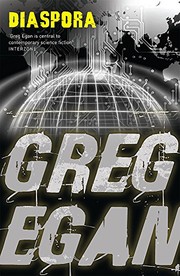Wolfgang Wopperer reviewed Diaspora by Greg Egan
A hard sci-fi milestone – for better or worse
3 stars
If I had read this book 10 years ago (or even 5), it might have felt like a revelation. Reading it today feels like entering a cul-de-sac.
Looking around it helps me understand a couple of things, though: How hard sci-fi works (or why it doesn’t), for one; what makes transhumanism so repulsive (and profoundly boring), for another.
Hard sci-fi is more science than fiction – or at least it tries to be. Equipped with enough knowledge about math, physics or whatever science of choice to go above the reader’s head, but not enough to enter scientific discourse itself, hard sci-fi is, I think, best understood as playing with potential scientific theories without ever having to spell them out. As such it’s not so much an exploration of a few wild ideas but the exploitation of some narrow ones.
This can be very interesting (in Egan’s case, …
If I had read this book 10 years ago (or even 5), it might have felt like a revelation. Reading it today feels like entering a cul-de-sac.
Looking around it helps me understand a couple of things, though: How hard sci-fi works (or why it doesn’t), for one; what makes transhumanism so repulsive (and profoundly boring), for another.
Hard sci-fi is more science than fiction – or at least it tries to be. Equipped with enough knowledge about math, physics or whatever science of choice to go above the reader’s head, but not enough to enter scientific discourse itself, hard sci-fi is, I think, best understood as playing with potential scientific theories without ever having to spell them out. As such it’s not so much an exploration of a few wild ideas but the exploitation of some narrow ones.
This can be very interesting (in Egan’s case, the idea of biological, i.e. physical computers “running” completely alien and hermetic forms of life existing in non-physical dimensions is really fascinating) or extremely boring (again in Egan’s case, using an imaginary fundamental physics based on wormholes just to stack trillions of universes on top of each other becomes really tedious really quickly).
But without a strong fiction component, the whole thing gets boring either way – whether we race through universes (Egan) or centuries (Vinge), whether there’s a mystery to understand or a puzzle to solve, the plots tend to be extraordinarily simple, the stories (and characters) extraordinarily flat.
And this connects to the problem(s) with transhumanism: Instead of embracing our socio-biological nature in all its random gore and glory as the source of meaning and purpose (and ideally exploring the contradiction inherent in this), it denounces everything biological as accidental and limited, just to get stuck with the abstract, ungrounded and thus limitless quest for some form of disembodied knowledge which we, limited creatures that we are, can’t ever reach.
The only way to justify this quest is to ignore the nature of complexity, and the only way to implement it is to remove the limits of time – hence the “rushing” (Egan) through eons and universes, enabled by consciousness uploads, nanomachinery and negentropic plot devices like fractal universes.
At the end of this race there’s primarily one thing: limitless boredom – not the readers’, in this case, but the protagonists’. And the few moments of happiness or fulfilment we glimpse are, oh wonder, when they give in to their “ancestral” nature and sacrifice themselves for others, fall in love, or just have some plain old fun. (All of which a true, fully implemented transhumanism would destroy.)
(That the nature of consciousness is the one question left open after the eons Diaspora’s protagonists spent rushing and researching is rather ironic: The best and easiest explanation, not only IRL, but also in the context of the story, would be that consciousness is part of the simulation the protagonists are running to make sense of the world – that it isn’t real, that there isn’t even a question to begin with. This is made more ironic by the fact that Dan Dennett, one of the most prominent proponents of such an “illusionist” account of consciousness, is one of the two sources on the topic named in the references.)
So I’ll rather stick with stories that explore ideas instead of exploiting them, expand my mind instead of enclosing it, let me empathise and be angry, laugh and weep, wonder and wander – and generally enjoy and suffer our limited and accidental existence, the source of and obstacle to all meaning.
As to Diaspora specifically: Egan was surely groundbreaking in establishing the by now well-known tropes of transhumanist fiction (uploads, nanomachinery, contempt for biology and fear of existential threats to humanity). But this not only comes at the cost outlined above, but also bypasses the opportunities for deeper ontological reflection (e.g. taking life existing in non-physical dimensions as a starting, not an end point) in favour of semi-weird physics and semi-abstract math.
Recommended as a historical document; as as work of art, not so much.


